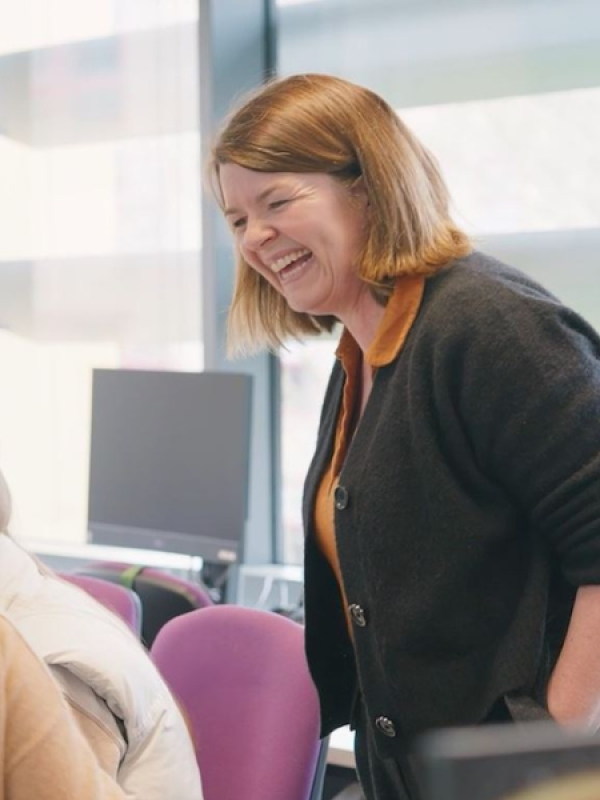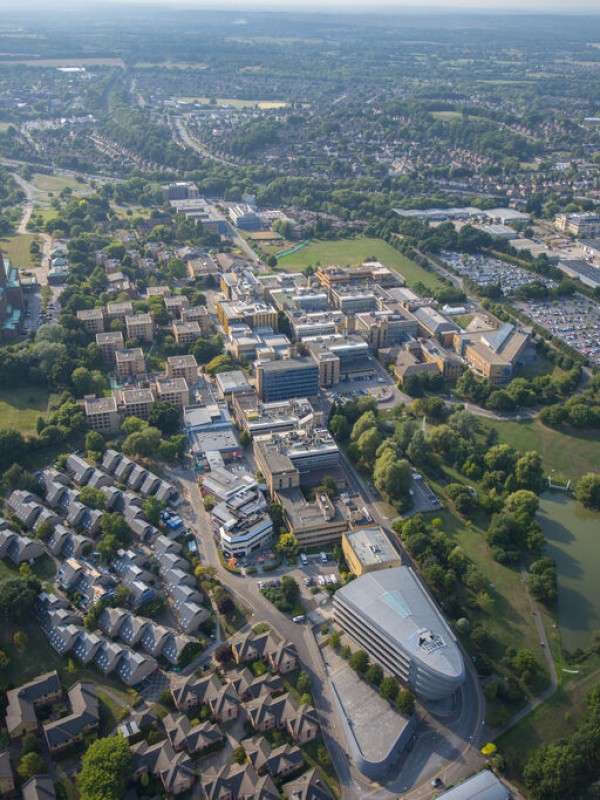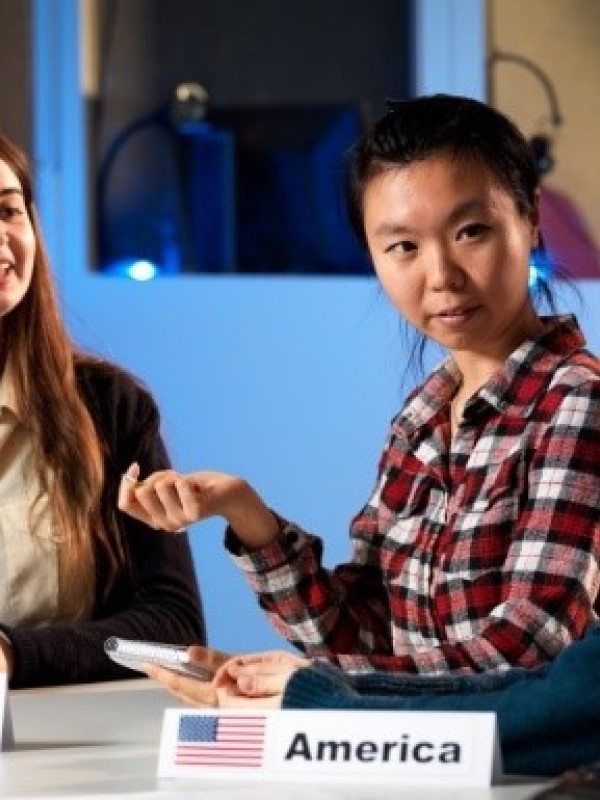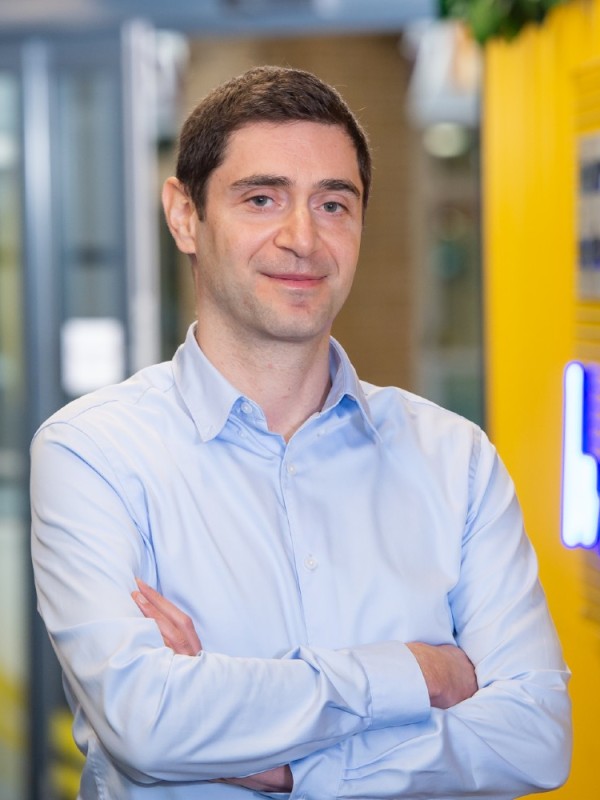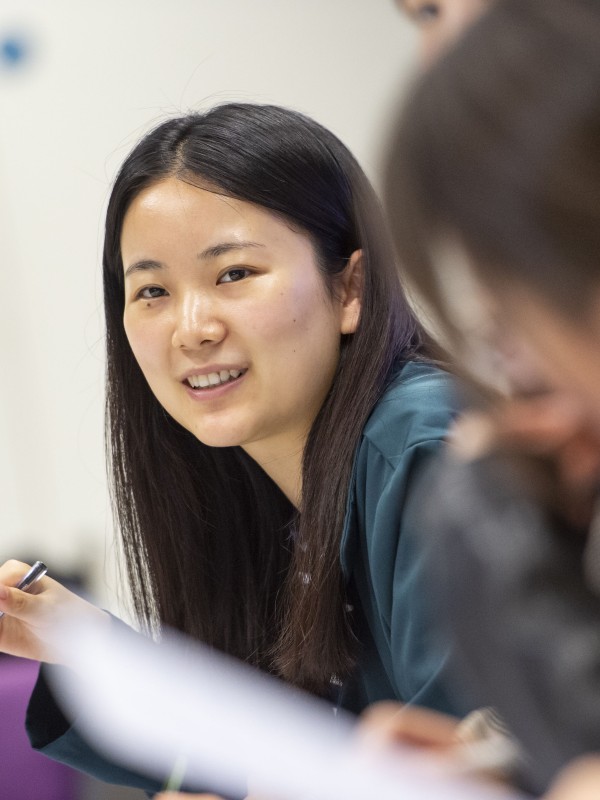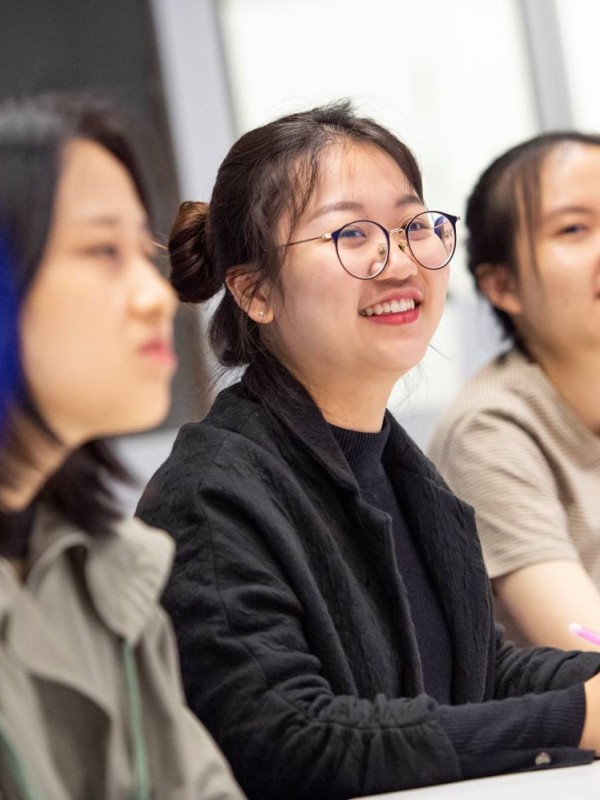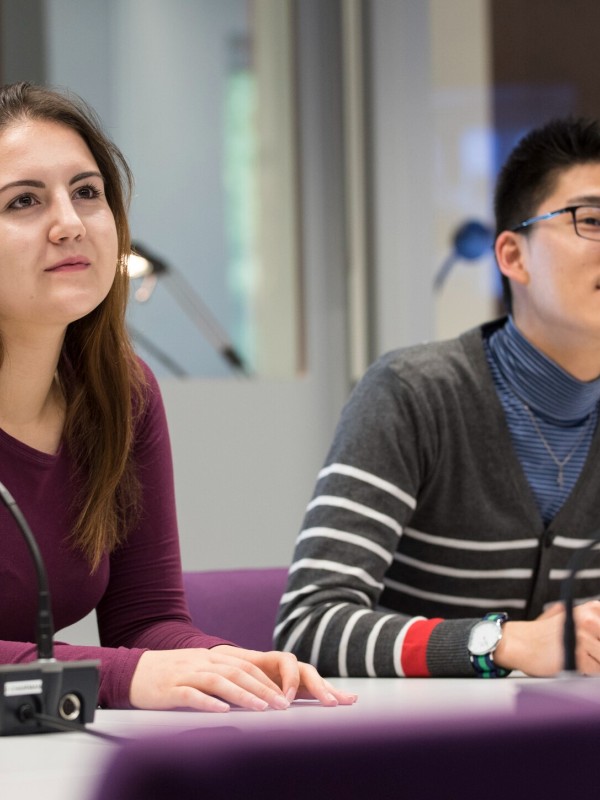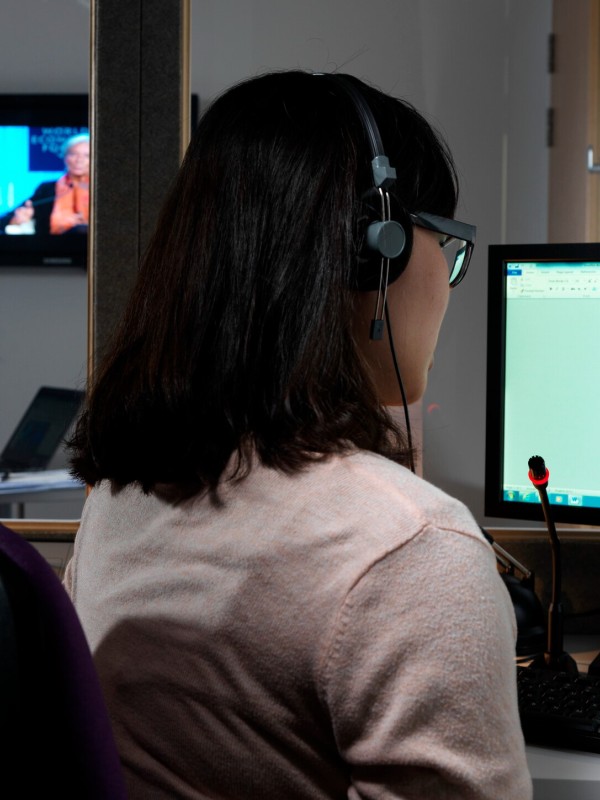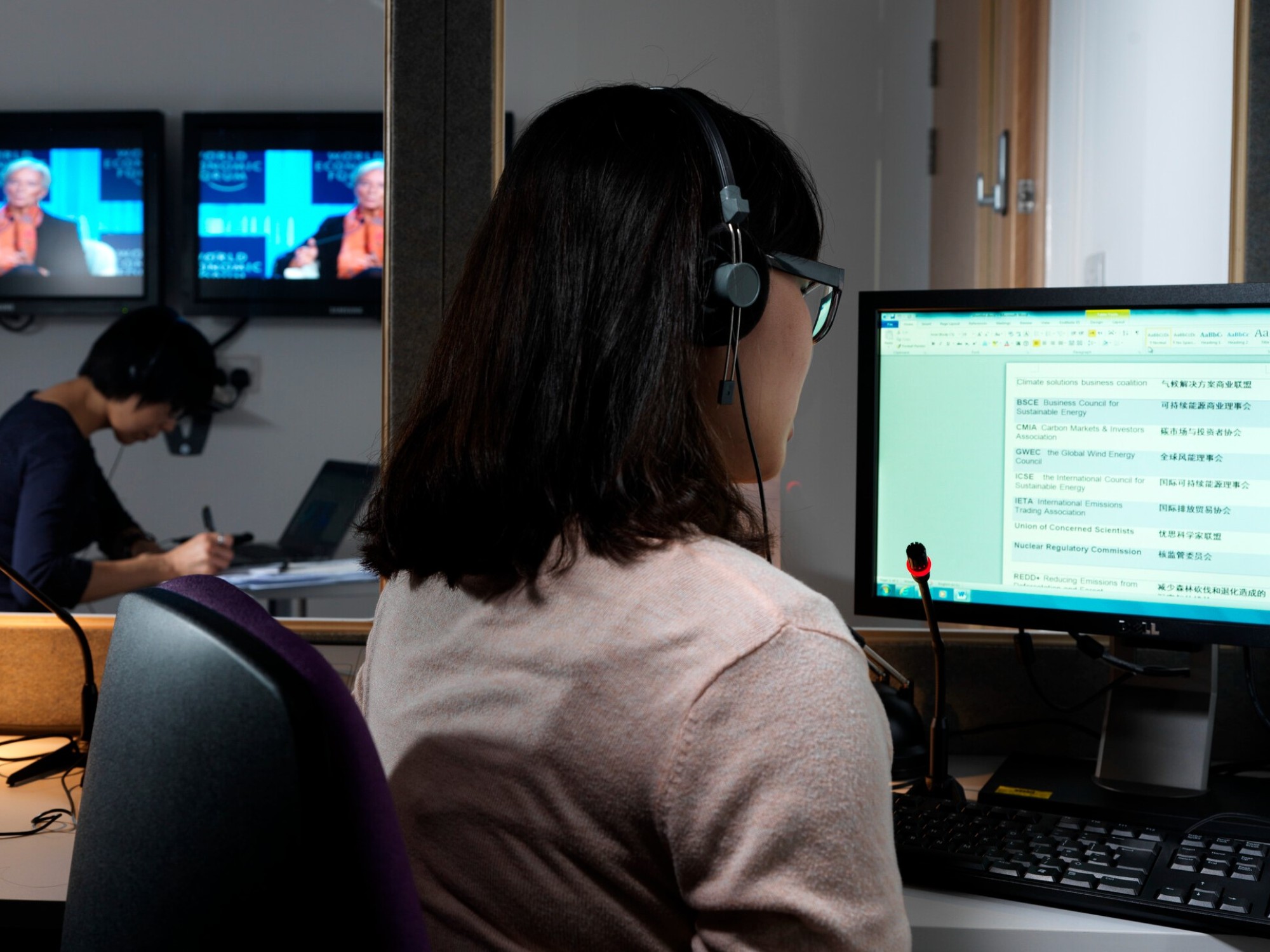
- Translation and AI
MA — 2026 entry Translation and AI
Building on the expertise of the world’s longest-running MA in Translation, we are leading the next generation of innovators in the language industry. We attract students from around the globe, providing a solid, all-round translator education, fit for the evolving realities and technological challenges of future language professions.
4,138+ people have created a bespoke digital prospectus
Why choose
this course?
- As language AI continues to advance, specialised skills such as translation remain essential. While AI tools can assist translators, they lack the nuanced understanding required for high-quality translation in demanding professional contexts.
- This course equips you to understand both the benefits and risks of current and emerging technologies, while helping you to identify and develop the critical linguistic skills that will be vital in a future with AI.
- With a strong practical component, our course is designed to meet the true needs of the professional language and translation market, enabling you to develop a future-ready CV as you study.
- As a UK centre of excellence in translation studies, supported by the Surrey Institute for People-Centred AI, all teaching in Surrey’s Centre for Translation Studies (CTS) is guided by our leading research on integrating tried-and-tested professional translation practices with cutting-edge technologies, especially AI.
- You will gain hands-on experience with a range of language technologies, including neural machine translation and generative AI (e.g., ChatGPT). You will also develop practical skills in post-editing and prompt writing—used daily by top translators and language professionals worldwide.
- We support internships and professional development activities, enabling you to collaborate with language service providers and build a professional engagement portfolio that you can present to future employers.
Statistics
100%
Of our literature and languages graduates are in employment or further study within 15 months of graduating (Graduate Outcomes Survey 2025, HESA)
10th for research impact
Literature and languages is ranked 10th for research impact in the Research Excellence Framework (REF) 2021
What you will study
Our MA Translation and AI course has both a multilingual and a Chinese pathway.
On this multilingual pathway we offer several languages, available on request.
You will develop professional translation skills to produce contextually accurate, culturally appropriate, and stylistically consistent translations. Guided by professional translators and experienced academics, you will explore different specialisms (e.g., business, legal, scientific, technical and medical domains), while building robust foundations in the linguistic, cognitive, quality-related, social and ethical dimensions of translation. You will also learn to understand, discuss and justify your translation decisions.
Uniquely, our course places emphasises on the use of cutting-edge tools to enhance your practice, including computer-assisted translation, corpus linguistics software for translation, neural machine translation and generative AI. With the Centre for Translation Studies (CTS)’ outstanding research track record in translation technologies, you will gain a critical understanding of the role of AI in today’s language services industry, empowering you to integrate these tools effectively and responsibly in your translation practice.
Optional modules focusing on the creative, business, technological and research dimensions of translation enable you to customise your learning according to your own strengths, personal interests and career ambitions. You will also have opportunities to gain industry experience through work placements.
Our flexible dissertation options enable you to choose from:
- A research-based dissertation on a specific translation topic
- An extended translation project accompanied by a reflective analytical commentary
- A critical report based on a language-industry work placement, or a skills-enhancement activity (such as a summer school or similar).
During the course, academic and professional excellence will be rewarded with the following prizes:
- RWS Campus Top Student Award (two Trados licenses)
- Project management training (one free-of-charge place in the Pro PM Training and Certification Programme)
- Professional Engagement Portfolio Prize
- Best Performance in Translation Prize.
An international community
Our course attracts students from all over the world, fostering a vibrant, multilingual and multicultural international community. Our MA cohorts blend recent graduates and more mature students, with diverse backgrounds and experience.
A future-proof education
Many texts, such as legal documents, medical reports, or literary works, demand a nuanced understanding of the writer’s intentions, specific terminologies, stylistic conventions, and an awareness of emotional impact that AI-powered translation tools cannot offer. While AI can be a powerful tool at the hands of a translator, it cannot replicate the linguistic precision, creativity and intuition that skilled human translators bring.
Our MA Translation and AI equips you with core translation and technological skills, along with expertise in terminology management, transcreation, localisation, multimodal and audiovisual translation, and other specialised language services. Industry-focused and informed by the CTS’s leading research, our course trains you in translating both creative and specialised texts while effectively using translation-memory systems, neural machine translation (NMT) and large language models (LLMs), performing post-editing tasks, and collaborating through digital platforms. You will explore the quality, uses and usability of AI-powered machine translation, the translation of audiovisual content for diverse audiences, and gain an introduction to natural language processing (NLP). You will also explore corpus linguistics techniques for terminology extraction and bilingual term compilation, and learn how to enhance translation quality and adapt translation products to different user preferences through advanced writing and editing techniques.
Our experienced academic staff will guide you through current and future industry challenges, while our professional translators bring first-hand knowledge, industry standards, and up-to-date market insights directly into the classroom.
Professional development
Our course equips you with the translation, technological, business, interpersonal and essential soft skills for a successful career in the language services industry.
You will practise translation in your working language combination(s) through simulations of real-world scenarios. With strong expertise in translation technologies, our graduates are well prepared to succeed in today’s translation and technology markets, adapt to evolving language services, and meet future market needs.
Through regular seminars with guest speakers (translators, interpreters, users of language services and researchers), you will gain further insights into the profession and the latest translation research. Our annual CTS careers fair connects our MA students with local and international language service and technology providers, supporting professional networking, while work placements provide first-hand industry experience.
You will receive guidance on developing a professional engagement portfolio to help you build a professional CV as you study. This includes documenting your collaborations with language services providers (such as work placements and volunteer translation) and other extra-curricular activities (such as mastering a new AI or translation tool, joining a professional association or attending a professional development workshop). You will also be encouraged to use your skills in the local community. Past students have translated for the University’s International Office, Surrey’s Watts Gallery and Guildford Walking Tours.
Industry links
We have forged close links with the main professional bodies in the language industry. For example, we are part of the prestigious Higher Education Partnership of the Chartered Institute of Linguists (CIOL) and a corporate member of the Institute of Translation and Interpreting (ITI). You can join these bodies as a student member during the course and become a full member after you graduate.
We also collaborate with the Translation Automation User Society (TAUS), the European Language Industry Association (ELIA), and the Globalization and Localization Association (GALA), which enables you to apply for a work placement with various translation partner companies. We have close links with many language service providers, and have an extensive network of visiting professionals, so you will benefit from excellent connections and be taught to industry standards.
The MA Translation and AI course is studied over one year (full-time) or two years (part-time).
The taught part of the programme is divided into eight 15-credit modules. A 15-credit module is indicative of 150 hours of learning. The hours of learning comprise of contact hours, guided learning and private study.
This course has three compulsory modules, and you must select another five optional modules. Optional modules will enable you to tailor the programme to your personal strengths and preferences.
You will complete your degree with a dissertation (60 credits), to be submitted at the beginning of September. You can choose between different types of dissertation:
- A topic-based dissertation
- An extended translation or interpreting analytical commentary
- A work placement (minimum 150 hours) plus critical report
- A skills-enhancement activity (minimum 60 hours) with a critical report.
The structure of our programmes follows clear educational aims that are tailored to each programme. These are all outlined in the programme specifications which include further details such as the learning outcomes:
Modules
Modules listed are indicative, reflecting the information available at the time of publication. Modules are subject to teaching availability, student demand and/or class size caps.
The University operates a credit framework for all taught programmes based on a 15-credit tariff, meaning all modules are comprised of multiples of 15 credits.
Course options
Year 1
Semester 1
Compulsory
This module introduces students to professional translation practice. Taking a holistic approach to translator education, students engage in regular, practical translation workshops in which they are encouraged to translate different types of texts and reflect critically on the principles and challenges of contemporary translation. Covering different types of professional assignments, including specialized terminology research, translation for different purposes and audiences, and proofreading and editing, the workshops enable students to engage critically with the quality of professional human translation; this will prepare students for professional translation practice, including post-editing and evaluation of machine-translation and artificial -intelligence (AI) solutions. The workshops are led by practising translators and include translation practice in language-specific and multilingual groups. The languages we regularly offer include: Arabic, Chinese, French, German, Greek, Italian, Korean, Polish, Norwegian, Portuguese, Romanian, Russian, Spanish, Swedish and Turkish, all paired with English. Other languages are available upon request (please ask). All languages are subject to demand and tutor availability. Close alignment with the module ‘Principles and Challenges of Translation and Interpreting’ enables students to confront a wide range of issues, equipping them with both a solid grounding in the guiding principles that underpin the discipline and the strategic competences required to engage in best practices in the profession. As part of the module, students begin to compile a Professional Engagement Portfolio based on additional profession-oriented activities undertaken independently with guidance; these activities are gradually documented during the academic year and then formally assessed and, for instance, typically include participation in workshops, talks and seminars organised by professional associations as well as additional training or work related to the programme.
View full module detailsThis module provides students with a systematic framework for understanding key concepts in Translation and Interpreting Studies and how they relate and apply to the rest of the programme and to everyday professional practice. The module enables students to confront a wide range of translation and interpreting challenges, from the lack of equivalence between languages and cultures to contemporary technological, ethical and societal issues affecting translation and interpreting practice, including the rapidly evolving use of machine translation and artificial intelligence (AI). The module equips students with both a solid grounding in the guiding principles of translation and interpreting, derived from scholarly engagement with the discipline, and the strategies required to engage in best practices in the profession and future career development. Taking a holistic approach to translator and interpreter education, the module consists of lectures and seminars that discuss the main principles and challenges of translation and interpreting, and explore solutions in close alignment with other modules in the programme. Students complement lectures and seminars with practical exercises and independent reading.
View full module detailsOptional
This module focuses on the intricate relationship between writing and translation through the practicalities of text production within a broad writing context (i.e. from fiction prose to technical text production), with a view to making translators aware of the basic elements required to create an effective text. It will combine weekly theoretical lectures with workshops to read and discuss students' work as well as rewriting and revising techniques.
View full module detailsThis module is an introduction to the practice of translation with the support of the most advanced technologies available, focusing on the demand for translators to possess expert skills to be in command of their performance and in control of the outputs of their work. The module is informed by the evolution of requirements of professional translation, namely under the influence of advanced technologies like machine translation. The focus of the module is on the interaction between translators and the computer tools that they use.
View full module detailsThis module introduces students to the fundamentals of Artificial Intelligence (AI) and its applications in the field of translation and interpreting. The course will cover a wide range of topics, from the basic concepts of AI to more advanced areas and techniques including machine learning, large language models (LLMs) and LLM leveraging and customisation of automatic speech recognition (ASR) engines. Students will be taught different prompting techniques which allows them to interact with LLMs like ChatGPT, so they can develop advanced problem-solving skills. Students will tackle AI-related tasks that are relevant in the fields of translation and interpreting, such as machine translation, customisation of ASR engines and the use of machine assistance in tasks requiring creativity skills (e.g. transcreation). They will also explore the ethical implications of AI and the potential impact of AI on the future of the language industry. Through a combination of theoretical lectures and practical exercises, students will gain hands-on experience with AI tools and techniques. They will learn how to use AI to improve their own translation and interpreting skills, as well as how to develop innovative AI-powered solutions for the language industry. Practical sessions will give participants hands-on experience in LLM prompting and using other AI-powered tools individually and in teams. The practical sessions will greatly enhance students¿ problem-solving skills, resourcefulness and their ability to identify problems, suggest alternative solutions and evaluate the outcomes of original methods used. This module is suitable for students with a variety of backgrounds, including those with no prior knowledge of AI. It is particularly relevant to students interested in translation, interpreting, language technology, and computational linguistics.
View full module detailsSemester 2
Compulsory
This module builds on the work of the Professional Translation Practice I module, by extending the approach of a connection between theory and practice to a connection between technology and practice. The module presents a sequence of themes related to the role of technology in translation, including the role of AI-powered tools such as neural machine translation and generative AI, recognising their different applications in translation and providing students with a growing perspective of the uses of technological tools to solve different professional translation challenges. The module focuses on several dimensions of tasks and roles translators need to perform in professional contexts. These are explored in a combination of language-specific and multilingual translation workshops and technology workshops, so that students have regular opportunities for hands-on practice and guidance from professional translators and experienced members of staff. As in semester 1, the languages we usually offer include: Arabic, Chinese, French, German, Greek, Italian, Korean, Polish, Norwegian, Portuguese, Romanian, Russian, Spanish, Swedish andor Turkish, all paired with English. Other languages are available upon request (please ask). All languages are subject to demand and tutor availability. As part of the module, students also continue to work on their Professional Engagement Portfolio from semester one (see Professional Translation Practice I).
View full module detailsOptional
In this module students learn about the distinctive features of multimodal translation, such as subtitling, dubbing, audio description and live subtitling. The module introduces students to the main challenges in each mode of audiovisual translation across a variety of genres, such as film, documentaries and video games. As such, the module will combine tutor-led components and components with a prominent practical element.
View full module detailsStudents taking this module explore the main theoretical and practical aspects of smart technologies for translation, with emphasis on how the latest developments in Natural Language Processing, Large Language Models (e.g. ChatGPT) and Corpus Linguistics can to help translators. The purpose of this module is to enable students to understand the challenges faced when using computers artificial intelligence to process text automatically or when they need to process speech as an input. The focus is on enhancing students¿ digital capabilities, especially those linked to the translation industry. The module will provide students with knowledge about the fields of Machine Translation (MT), Natural Language Processing (NLP), Large Language Models (LLMs) and Corpus Linguistics (CL). The module will start with an introduction to NLP and machine translation and will present different paradigms to produce automatic translations. Students will be provided with hands-on experience on how to train translation engines, and how it is possible to evaluate MT, as well as how to use LLMs for translation related tasks. . Other topics such as terminology extraction, speech recognition and translation will also be covered. The students will learn how to harvest relevant corpora from the web, clean them and use them for translation-related tasks.The practical tasks addressed in the module will improve students¿ problem-solving skills and contribute to their future career development. Knowledge of programming will not be necessary, but students who have a programming background will be given the opportunity to use this knowledge in the module. Links will be established with other modules such as TRAM511 and TRAM496.
View full module detailsThis module introduces students to the key critical considerations and creative and technical decisions faced by translators of works in the cultural/creative industries, such as the film, theatre, creative or publishing industries. By focusing on the repertoires and creative decisions that such translation entails, the definition of ‘translation’ will be examined rather broadly, namely, both as a form of interlingual transfer and as a creative platform for (re)writing texts. Examples are offered from the areas of advertising, cultural heritage, tourism, performance (drama translation) and entertainment/art (children’s literature, comic books, films). The module is suitable for students with different language backgrounds and it offers a creative practical component as well as insights into how the creative industries work.
View full module detailsThis module introduces students to the professional dimension of the different fields of Public Service Interpreting and Translation (PSIT). It covers current issues such as the specific ethical requirements, codes of conduct, working conditions and legislation associated with PSIT, as well as new trends in a constantly evolving industry and their repercussions on the PSIT landscape.
View full module detailsSemester 1 & 2
Compulsory
This module is designed to enable students to consolidate and further advance the knowledge and skills acquired during the taught components of the programme, and gain experience working independently on an extended project through one of the following options: Research on a Translation or Interpreting Studies topic and a written dissertation An extended translation with an analytical commentary or an interpreting simulation with an analytical commentary A work placement of at least 150 hours accompanied by a critical report. If taking this option, it is the responsibility of students to find a professional placement approved by CTS (this includes volunteer translation and a range of ad hoc language-industry activities carried out during the academic year). CTS will support students in finding a placement through professional engagement portfolios, invited seminar talks and a dedicated language industries careers fair. A practical skills-enhancement programme of 60 hours or equivalent and a written report. If taking this option, the skills-enhancement programme can be either run by CTS (subject to availability and demand) or external. If external (e.g. a summer school run by another organization), the programme must be approved by CTS in advance
View full module detailsOptional modules for Year 1 (full-time) - FHEQ Level 8
Students must choose five optional modules - two in Semester 1 and three in Semester 2.
Professional Translation Practice language options include Arabic, Chinese (Mandarin), French, German, Greek, Italian, Korean, Norwegian, Polish, Portuguese, Romanian, Russian, Spanish, Swedish and Turkish paired with English. They require native or near-native competency in English and one of the above languages.
Year 1
Semester 1
Compulsory
This module introduces students to professional translation practice. Taking a holistic approach to translator education, students engage in regular, practical translation workshops in which they are encouraged to translate different types of texts and reflect critically on the principles and challenges of contemporary translation. Covering different types of professional assignments, including specialized terminology research, translation for different purposes and audiences, and proofreading and editing, the workshops enable students to engage critically with the quality of professional human translation; this will prepare students for professional translation practice, including post-editing and evaluation of machine-translation and artificial -intelligence (AI) solutions. The workshops are led by practising translators and include translation practice in language-specific and multilingual groups. The languages we regularly offer include: Arabic, Chinese, French, German, Greek, Italian, Korean, Polish, Norwegian, Portuguese, Romanian, Russian, Spanish, Swedish and Turkish, all paired with English. Other languages are available upon request (please ask). All languages are subject to demand and tutor availability. Close alignment with the module ‘Principles and Challenges of Translation and Interpreting’ enables students to confront a wide range of issues, equipping them with both a solid grounding in the guiding principles that underpin the discipline and the strategic competences required to engage in best practices in the profession. As part of the module, students begin to compile a Professional Engagement Portfolio based on additional profession-oriented activities undertaken independently with guidance; these activities are gradually documented during the academic year and then formally assessed and, for instance, typically include participation in workshops, talks and seminars organised by professional associations as well as additional training or work related to the programme.
View full module detailsThis module provides students with a systematic framework for understanding key concepts in Translation and Interpreting Studies and how they relate and apply to the rest of the programme and to everyday professional practice. The module enables students to confront a wide range of translation and interpreting challenges, from the lack of equivalence between languages and cultures to contemporary technological, ethical and societal issues affecting translation and interpreting practice, including the rapidly evolving use of machine translation and artificial intelligence (AI). The module equips students with both a solid grounding in the guiding principles of translation and interpreting, derived from scholarly engagement with the discipline, and the strategies required to engage in best practices in the profession and future career development. Taking a holistic approach to translator and interpreter education, the module consists of lectures and seminars that discuss the main principles and challenges of translation and interpreting, and explore solutions in close alignment with other modules in the programme. Students complement lectures and seminars with practical exercises and independent reading.
View full module detailsOptional
This module focuses on the intricate relationship between writing and translation through the practicalities of text production within a broad writing context (i.e. from fiction prose to technical text production), with a view to making translators aware of the basic elements required to create an effective text. It will combine weekly theoretical lectures with workshops to read and discuss students' work as well as rewriting and revising techniques.
View full module detailsThis module introduces students to the fundamentals of Artificial Intelligence (AI) and its applications in the field of translation and interpreting. The course will cover a wide range of topics, from the basic concepts of AI to more advanced areas and techniques including machine learning, large language models (LLMs) and LLM leveraging and customisation of automatic speech recognition (ASR) engines. Students will be taught different prompting techniques which allows them to interact with LLMs like ChatGPT, so they can develop advanced problem-solving skills. Students will tackle AI-related tasks that are relevant in the fields of translation and interpreting, such as machine translation, customisation of ASR engines and the use of machine assistance in tasks requiring creativity skills (e.g. transcreation). They will also explore the ethical implications of AI and the potential impact of AI on the future of the language industry. Through a combination of theoretical lectures and practical exercises, students will gain hands-on experience with AI tools and techniques. They will learn how to use AI to improve their own translation and interpreting skills, as well as how to develop innovative AI-powered solutions for the language industry. Practical sessions will give participants hands-on experience in LLM prompting and using other AI-powered tools individually and in teams. The practical sessions will greatly enhance students¿ problem-solving skills, resourcefulness and their ability to identify problems, suggest alternative solutions and evaluate the outcomes of original methods used. This module is suitable for students with a variety of backgrounds, including those with no prior knowledge of AI. It is particularly relevant to students interested in translation, interpreting, language technology, and computational linguistics.
View full module detailsSemester 2
Compulsory
This module builds on the work of the Professional Translation Practice I module, by extending the approach of a connection between theory and practice to a connection between technology and practice. The module presents a sequence of themes related to the role of technology in translation, including the role of AI-powered tools such as neural machine translation and generative AI, recognising their different applications in translation and providing students with a growing perspective of the uses of technological tools to solve different professional translation challenges. The module focuses on several dimensions of tasks and roles translators need to perform in professional contexts. These are explored in a combination of language-specific and multilingual translation workshops and technology workshops, so that students have regular opportunities for hands-on practice and guidance from professional translators and experienced members of staff. As in semester 1, the languages we usually offer include: Arabic, Chinese, French, German, Greek, Italian, Korean, Polish, Norwegian, Portuguese, Romanian, Russian, Spanish, Swedish andor Turkish, all paired with English. Other languages are available upon request (please ask). All languages are subject to demand and tutor availability. As part of the module, students also continue to work on their Professional Engagement Portfolio from semester one (see Professional Translation Practice I).
View full module detailsOptional
In this module students learn about the distinctive features of multimodal translation, such as subtitling, dubbing, audio description and live subtitling. The module introduces students to the main challenges in each mode of audiovisual translation across a variety of genres, such as film, documentaries and video games. As such, the module will combine tutor-led components and components with a prominent practical element.
View full module detailsStudents taking this module explore the main theoretical and practical aspects of smart technologies for translation, with emphasis on how the latest developments in Natural Language Processing, Large Language Models (e.g. ChatGPT) and Corpus Linguistics can to help translators. The purpose of this module is to enable students to understand the challenges faced when using computers artificial intelligence to process text automatically or when they need to process speech as an input. The focus is on enhancing students¿ digital capabilities, especially those linked to the translation industry. The module will provide students with knowledge about the fields of Machine Translation (MT), Natural Language Processing (NLP), Large Language Models (LLMs) and Corpus Linguistics (CL). The module will start with an introduction to NLP and machine translation and will present different paradigms to produce automatic translations. Students will be provided with hands-on experience on how to train translation engines, and how it is possible to evaluate MT, as well as how to use LLMs for translation related tasks. . Other topics such as terminology extraction, speech recognition and translation will also be covered. The students will learn how to harvest relevant corpora from the web, clean them and use them for translation-related tasks.The practical tasks addressed in the module will improve students¿ problem-solving skills and contribute to their future career development. Knowledge of programming will not be necessary, but students who have a programming background will be given the opportunity to use this knowledge in the module. Links will be established with other modules such as TRAM511 and TRAM496.
View full module detailsThis module introduces students to the key critical considerations and creative and technical decisions faced by translators of works in the cultural/creative industries, such as the film, theatre, creative or publishing industries. By focusing on the repertoires and creative decisions that such translation entails, the definition of ‘translation’ will be examined rather broadly, namely, both as a form of interlingual transfer and as a creative platform for (re)writing texts. Examples are offered from the areas of advertising, cultural heritage, tourism, performance (drama translation) and entertainment/art (children’s literature, comic books, films). The module is suitable for students with different language backgrounds and it offers a creative practical component as well as insights into how the creative industries work.
View full module detailsThis module introduces students to the professional dimension of the different fields of Public Service Interpreting and Translation (PSIT). It covers current issues such as the specific ethical requirements, codes of conduct, working conditions and legislation associated with PSIT, as well as new trends in a constantly evolving industry and their repercussions on the PSIT landscape.
View full module detailsOptional modules for Year 1 (part-time) - FHEQ Level 7
For further information regarding programme structure and module selection, please refer to the course catalogue.
Year 2
Semester 1
Optional
This module focuses on the intricate relationship between writing and translation through the practicalities of text production within a broad writing context (i.e. from fiction prose to technical text production), with a view to making translators aware of the basic elements required to create an effective text. It will combine weekly theoretical lectures with workshops to read and discuss students' work as well as rewriting and revising techniques.
View full module detailsThis module is an introduction to the practice of translation with the support of the most advanced technologies available, focusing on the demand for translators to possess expert skills to be in command of their performance and in control of the outputs of their work. The module is informed by the evolution of requirements of professional translation, namely under the influence of advanced technologies like machine translation. The focus of the module is on the interaction between translators and the computer tools that they use.
View full module detailsThis module introduces students to the fundamentals of Artificial Intelligence (AI) and its applications in the field of translation and interpreting. The course will cover a wide range of topics, from the basic concepts of AI to more advanced areas and techniques including machine learning, large language models (LLMs) and LLM leveraging and customisation of automatic speech recognition (ASR) engines. Students will be taught different prompting techniques which allows them to interact with LLMs like ChatGPT, so they can develop advanced problem-solving skills. Students will tackle AI-related tasks that are relevant in the fields of translation and interpreting, such as machine translation, customisation of ASR engines and the use of machine assistance in tasks requiring creativity skills (e.g. transcreation). They will also explore the ethical implications of AI and the potential impact of AI on the future of the language industry. Through a combination of theoretical lectures and practical exercises, students will gain hands-on experience with AI tools and techniques. They will learn how to use AI to improve their own translation and interpreting skills, as well as how to develop innovative AI-powered solutions for the language industry. Practical sessions will give participants hands-on experience in LLM prompting and using other AI-powered tools individually and in teams. The practical sessions will greatly enhance students¿ problem-solving skills, resourcefulness and their ability to identify problems, suggest alternative solutions and evaluate the outcomes of original methods used. This module is suitable for students with a variety of backgrounds, including those with no prior knowledge of AI. It is particularly relevant to students interested in translation, interpreting, language technology, and computational linguistics.
View full module detailsSemester 2
Optional
In this module students learn about the distinctive features of multimodal translation, such as subtitling, dubbing, audio description and live subtitling. The module introduces students to the main challenges in each mode of audiovisual translation across a variety of genres, such as film, documentaries and video games. As such, the module will combine tutor-led components and components with a prominent practical element.
View full module detailsStudents taking this module explore the main theoretical and practical aspects of smart technologies for translation, with emphasis on how the latest developments in Natural Language Processing, Large Language Models (e.g. ChatGPT) and Corpus Linguistics can to help translators. The purpose of this module is to enable students to understand the challenges faced when using computers artificial intelligence to process text automatically or when they need to process speech as an input. The focus is on enhancing students¿ digital capabilities, especially those linked to the translation industry. The module will provide students with knowledge about the fields of Machine Translation (MT), Natural Language Processing (NLP), Large Language Models (LLMs) and Corpus Linguistics (CL). The module will start with an introduction to NLP and machine translation and will present different paradigms to produce automatic translations. Students will be provided with hands-on experience on how to train translation engines, and how it is possible to evaluate MT, as well as how to use LLMs for translation related tasks. . Other topics such as terminology extraction, speech recognition and translation will also be covered. The students will learn how to harvest relevant corpora from the web, clean them and use them for translation-related tasks.The practical tasks addressed in the module will improve students¿ problem-solving skills and contribute to their future career development. Knowledge of programming will not be necessary, but students who have a programming background will be given the opportunity to use this knowledge in the module. Links will be established with other modules such as TRAM511 and TRAM496.
View full module detailsThis module introduces students to the key critical considerations and creative and technical decisions faced by translators of works in the cultural/creative industries, such as the film, theatre, creative or publishing industries. By focusing on the repertoires and creative decisions that such translation entails, the definition of ‘translation’ will be examined rather broadly, namely, both as a form of interlingual transfer and as a creative platform for (re)writing texts. Examples are offered from the areas of advertising, cultural heritage, tourism, performance (drama translation) and entertainment/art (children’s literature, comic books, films). The module is suitable for students with different language backgrounds and it offers a creative practical component as well as insights into how the creative industries work.
View full module detailsThis module introduces students to the professional dimension of the different fields of Public Service Interpreting and Translation (PSIT). It covers current issues such as the specific ethical requirements, codes of conduct, working conditions and legislation associated with PSIT, as well as new trends in a constantly evolving industry and their repercussions on the PSIT landscape.
View full module detailsSemester 1 & 2
Compulsory
This module is designed to enable students to consolidate and further advance the knowledge and skills acquired during the taught components of the programme, and gain experience working independently on an extended project through one of the following options: Research on a Translation or Interpreting Studies topic and a written dissertation An extended translation with an analytical commentary or an interpreting simulation with an analytical commentary A work placement of at least 150 hours accompanied by a critical report. If taking this option, it is the responsibility of students to find a professional placement approved by CTS (this includes volunteer translation and a range of ad hoc language-industry activities carried out during the academic year). CTS will support students in finding a placement through professional engagement portfolios, invited seminar talks and a dedicated language industries careers fair. A practical skills-enhancement programme of 60 hours or equivalent and a written report. If taking this option, the skills-enhancement programme can be either run by CTS (subject to availability and demand) or external. If external (e.g. a summer school run by another organization), the programme must be approved by CTS in advance
View full module detailsOptional modules for Year 2 (part-time) - FHEQ Level 7
Students must choose four optional modules in year 2.
General course information
Contact hours
Contact hours can vary across our modules. Full details of the contact hours for each module are available from the University of Surrey's module catalogue. See the modules section for more information.
Timetable
New students will receive their personalised timetable during Welcome Week. In later semesters, at least one week before the start of the semester.
While we make every effort to ensure that timetables are as student-friendly as possible, scheduled teaching can take place on any day of the week (Monday – Friday). Our Translation Studies seminars take place on Wednesday afternoons – attendance is optional but strongly encouraged.
Please note that as our practice-based classes are normally provided by professional interpreters, we may sometimes have to reschedule classes to accommodate professional commitments.
View our code of practice for the scheduling of teaching and assessment (PDF) for more information.
Location
This course is based at Stag Hill campus. Stag Hill is the University's main campus and where the majority of our courses are taught.
We offer careers information, advice and guidance to all students whilst studying with us, which is extended to our alumni for three years after leaving the University.
There is a growing demand for novel modes of translation and multilingual language services that our MA Translation and AI students are specifically prepared for.
The course’s work placement dissertation option enables you to gain professional experience and nurture a close relationship with a prospective employer. We are regularly contacted by stakeholders from the language services industry wishing to recruit Surrey MA Translation and AI students and recent graduates.
Job opportunities include:
- In-house and/or freelance translators
- Multilingual content writers
- Language-services managers
- Localisation specialists
- Terminology specialists
- Transcreation specialists
- Language and translation tutors.
Recent Surrey graduates have pursued careers at international organisations, government bodies and the private sector, as well as developing successful freelance ventures. A few of our MA students carry on studying for a PhD, which will open doors for them to embrace an academic career.
To further help our students with work opportunities in the language services industry, we host an annual careers fair where local and international companies with an active interest in MA Translation and AI graduates meet our students in an informal, friendly atmosphere.
As a student, you will have classes in dedicated language-software computer labs. You will work hands-on with state-of-the-art tools such as:


Hayley Smith
Student - Translation MA

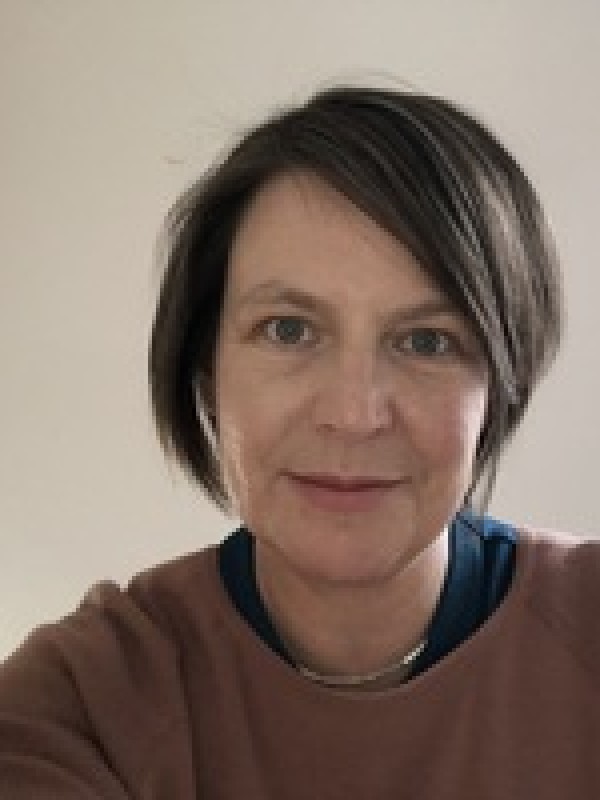
Anna Pakes
Student - Translation MA
UK qualifications
If you are a native English speaker, we require a minimum of a 2:2 UK honours degree in one of the languages listed below or in a related subject taught in one of these languages.
Native speakers of a relevant language (from the list below) require a degree in an arts, humanities or social science (e.g. economics, management, tourism and hospitality management) subject.
Alternative subjects will be considered by the Faculty on a case-by-case basis.
Relevant work experience to be considered by the Faculty on a case-by-case basis.
The languages available in the programme (subject to demand) are:
- Arabic
- Chinese (Mandarin)
- French
- German
- Greek
- Italian
- Korean
- Polish
- Norwegian
- Portuguese
- Romanian
- Russian
- Spanish
- Swedish
- Turkish.
Other languages may be available upon request.
English language requirements
IELTS Academic: 6.5 overall with 6.5 in writing and 6.0 in each other element.
These are the English language qualifications and levels that we can accept.
If you do not currently meet the level required for your programme, we offer intensive pre-sessional English language courses, designed to take you to the level of English ability and skill required for your studies here.
Recognition of prior learning
We recognise that many students enter their course with valuable knowledge and skills developed through a range of ways.
If this applies to you, the recognition of prior learning process may mean you can join a course without the formal entry requirements, or at a point appropriate to your previous learning and experience.
There are restrictions for some courses and fees may be payable for certain claims. Please contact the Admissions team with any queries.
Scholarships and bursaries
Discover what scholarships and bursaries are available to support your studies.
Fees per year
Explore UKCISA’s website for more information if you are unsure whether you are a UK or overseas student. View the list of fees for all postgraduate courses.
September 2026 - Full-time - 1 year
- UK
- £11,300
- Overseas
- £22,700
September 2026 - Part-time - 2 years
- UK
- £5,700
- Overseas
- £11,400
- These fees apply to the academic year 2026-27 only. Fees are reviewed annually, and tuition fees may increase for courses running over more than one year.
Payment schedule
- Students with Tuition Fee Loan: the Student Loans Company pay fees in line with their schedule (students on an unstructured self-paced part-time course are not eligible for a Tuition Fee Loan).
- Students without a Tuition Fee Loan: pay their fees either in full at the beginning of the programme or in two instalments as follows:
- 50% payable 10 days after the invoice date (expected to be October/November of each academic year)
- 50% in January of the same academic year.
- Students on part-time programmes where fees are paid on a modular basis: cannot pay fees by instalment.
- Sponsored students: must provide us with valid sponsorship information that covers the period of study.
The exact date(s) will be on invoices.
Additional costs
There could be potential travel costs for the dissertation module if the work placement is opted for. This may include expenses such as travel to and from the workplace, any required accommodation and related subsidiary costs.
However, please note that in the language services industry it is often possible to carry out work placements or parts of it remotely/virtually.
Funding
You may be able to borrow money to help pay your tuition fees and support you with your living costs. Find out more about postgraduate student finance.
Apply online
To apply online first select the course you'd like to apply for then log in.
Select your course
Choose the course option you wish to apply for.
Sign in
Create an account and sign into our application portal.
Please note that we may have to close applications before the stated deadline if we receive a high volume of suitable applications. We advise you to submit your application as soon as it is ready.
ApplyPlease note that we may have to close applications before the stated deadline if we receive a high volume of suitable applications. We advise you to submit your application as soon as it is ready.
ApplyAdmissions information
Once you apply, you can expect to hear back from us within 14 days. This might be with a decision on your application or with a request for further information.
Our code of practice for postgraduate taught admissions explains how the Admissions team considers applications and admits students. Read our postgraduate applicant guidance for more information on applying.
About the University of Surrey
Need more information?
Contact our Admissions team or talk to a current University of Surrey student online.
Terms and conditions
When you accept an offer to study at the University of Surrey, you are agreeing to follow our policies and procedures, student regulations, and terms and conditions.
We provide these terms and conditions at offer stage and are shown again at registration. You will be asked to accept these terms and conditions when you accept the offer made to you.
View our generic registration terms and conditions (PDF) for the 2025/26 academic year, as a guide on what to expect.
Disclaimer
This online prospectus has been published in advance of the academic year to which it applies.
Whilst we have done everything possible to ensure this information is accurate, some changes may happen between publishing and the start of the course.
It is important to check this website for any updates before you apply for a course with us. Read our full disclaimer.
